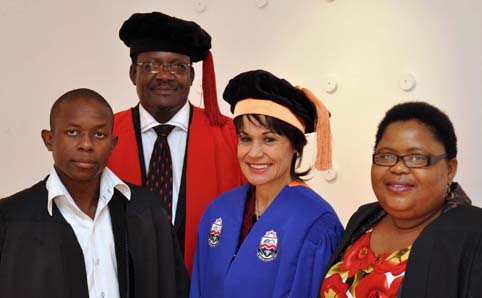 |
|
At the certificate ceremony were, from the left: Wisani Mashamba, Deputy Manager: Human Resources and Development in the Department of Sport, Arts and Culture in Limpopo; Dr Philemon Akach, Head of the Department of South African Sign Language; Prof. Driekie Hay, Vice-Rector: Academic; and Ms Fhumulani Maguga, Senior Manager: Human Resources and Development in the Department of Sport, Arts and Culture in Limpopo.
Photo: Stephen Collett
25 April 2012
|
Certificates were awarded to a group of staff members from the Department of Sport, Arts and Culture in Limpopo who successfully completed a short course in South African Sign Language at the University of the Free State (UFS). Fourteen staff members from this department received their certificates at a ceremony on the Bloemfontein Campus.
Prof. Driekie Hay, Vice-Rector: Academic, said the UFS was the first tertiary institution in the country, and in Africa, to present Sign Language as an academic course. Prof. Hay urged the 14 men and women who received their certificates to use the qualification to make a difference in the lives of others.
Dr Philemon Akach, Head of the Department of South African Sign Language, mentioned the difficulties that deaf people still have to cope with. “Poverty and neglect is rife. In this country you have to toyi-toyi to be heard. If deaf people toyi-toyi, will they be heard?”
Ms Fhumulani Maguga, Senior Manager: Human Resources and Development in the Department of Sport, Arts and Culture in Limpopo, said her department is looking into future partnerships with the UFS.